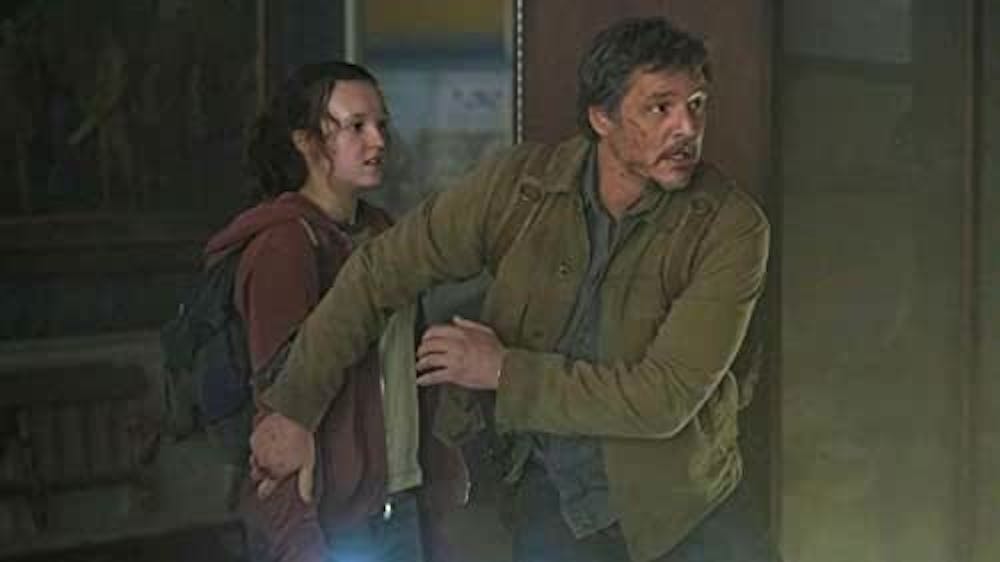Now filling in the coveted Sunday evening HBO slot — formerly held by “Game of Thrones,” “The Sopranos” and, most recently, “The White Lotus” — is the post-apocalyptic drama series “The Last of Us.”
Based on the popular Sony video game, “The Last of Us” is set 20 years following a global fungal outbreak in a world ridden by terror and destruction. The series stars Pedro Pascal: an actor with an apparent touch of gold for all of the shows he appears in, á la “Narcos” and “The Mandalorian.” His co-star is Bella Ramsey; for Thrones fans, you may remember her as Lyanna Mormont, the bad-ass warrior girl who took over as head of her house at 10 years old. But now instead of White Walkers, she fights “the infected,” a group of zombie-like creatures who spread the invasive fungus.
The series follows Joel (Pascal), a survivor of the apocalypse who is tasked with smuggling a 14-year-old girl, Ellie (Ramsey), across the war-ruined United States. In their society, anarchy prevails, and people will do anything to survive. Such a reality has brought out the worst in men and has in turn hardened our protagonist Joel.
Grieved by loss, Joel has lost all love of life and hope for humanity itself. Now insert Ellie: a care-free, seemingly fearless girl, who may also be the answer to finding a cure to the fungal infection. Ellie has never been in a car or smelled the aroma of coffee. Hell, she has never even left the “QZ,” the barricaded quarantine zone of downtown Boston. And yet the two complement each other in the most surprising ways, in which Joel begins to take form as the father Ellie never had and Ellie the daughter Joel lost 20 years prior.
Sci-fi shows are often hit or miss. At best, you have “Stranger Things” and “Black Mirror,” whereby strong lead acting, stunning visuals and thought-provoking narratives frame the way for a hit show.
At the worst, you have… well, pretty much any network TV attempt at a dystopian series. Many of these shows often lean too heavily on CGI and ridiculous plotlines to draw in an audience. In doing so, they neglect authentic dialogue and disregard critical character development.
Nonetheless, due to the strong acting of Pascal, Ramsey and many well-regarded actors in recurring roles, I feel confident that “The Last of Us” will not flop. The third episode — which is the best and boldest episode thus far — confirmed this for me.
In this episode, the unlikely love story of Bill and Frank (played by Nick Offerman and Murray Bartlett), though just minor characters in the original video game, is put on centerfold for the audience. One may consider the episode out of place, for it lacks gore, zombies and Ellie and Joel altogether. However, where it lacks in action sequences, Episode 3 makes up for in a compelling love narrative that explores companionship and human nature. It captures Bill and Frank’s most vulnerable moments and shows how the two men manage to build a life together in the apocalypse. Episode 3 was the biggest risk of the season, straying far from the show’s center plot, and yet, I think it was the greatest decision the directors and writers could have made.
Naturally, “The Last of Us” will draw comparisons to “The Walking Dead,” and rightfully so. Both follow the survivors of a zombie outbreak and include adrenaline-pumping plot sequences. With that said, although only four episodes have been released, “The Last of Us” already does certain things better than its predecessor. For starters, the undead are far more terrifying in “The Last of Us.” No one is doubting that the walkers looked terrifying, but they appear far easier to be killed. They walk aimlessly on the streets and are often mowed down by the band of survivors. In contrast, the Infected are extremely elusive, strong, can withstand more than a human, and will stop at nothing to spread the fungus to a new host.
Unlike “The Walking Dead,” “The Last of Us” provides a clear origin story for the outbreak, one that is scarily scientifically sound and consistent with a process that occurs in our natural world. The parasitic fungus, from the genus Cordyceps, has the capacity to hijack the minds of insects and drain all its nutrients. It then compels the insect to ascend a nearby plant stem, where it clings onto a leaf. At this point, the fungus emerges from the body of the ants and releases spores onto the forest floor.
In the world of “The Last of Us,” the fungus has mutated to accommodate rising global temperatures and can infect warm-blooded organisms, namely humans.
As harmful as climate change is, I am not suggesting that a zombie outbreak should be at the top of the agenda for threats against humanity. My goal is simply to denote that “The Last of Us” is not like all other sci-fi shows. It is grounded in a premise that, though far-fetched, has not yet reached utter ridiculousness. Strong dialogue and engaging plot lines encourage the audience to form parasocial connections with the show’s characters. If it wasn’t already clear, I would highly recommend this show to all.
Get The Chronicle straight to your inbox
Sign up for our weekly newsletter. Cancel at any time.

